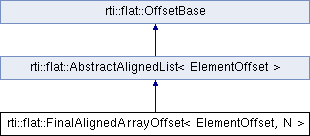Offset to an array of final elements. More...
#include <SequenceOffsets.hpp>

Public Member Functions | |
| ElementOffset | get_element (unsigned int i) |
| Gets the Offset to an element. More... | |
 Public Member Functions inherited from rti::flat::AbstractAlignedList< ElementOffset > Public Member Functions inherited from rti::flat::AbstractAlignedList< ElementOffset > | |
| iterator | begin () |
| Gets an iterator to the first Offset. More... | |
| iterator | end () |
| Gets an iterator to the past-the-end element. More... | |
 Public Member Functions inherited from rti::flat::OffsetBase Public Member Functions inherited from rti::flat::OffsetBase | |
| bool | is_null () const |
| Indicates whether this Offset doesn't point to a valid element. More... | |
| bool | is_cpp_compatible () const |
| Indicates whether rti::flat::plain_cast() is possible. More... | |
| const unsigned char * | get_buffer () const |
| Gets this member's position in the buffer. More... | |
| offset_t | get_buffer_size () const |
| Gets the size, in bytes, of this member in the buffer. More... | |
Additional Inherited Members | |
 Public Types inherited from rti::flat::AbstractAlignedList< ElementOffset > Public Types inherited from rti::flat::AbstractAlignedList< ElementOffset > | |
| typedef SequenceIterator< ElementOffset, typename ElementOffset::offset_kind > | iterator |
| The iterator type, SequenceIterator. More... | |
Detailed Description
template<typename ElementOffset, unsigned int N>
class rti::flat::FinalAlignedArrayOffset< ElementOffset, N >
Offset to an array of final elements.
- Template Parameters
-
ElementOffset A final struct Offset, such as MyFlatFinalOffset. N The array bound. For multidimensional arrays, Nis the product of each dimension bound.
Represents an Offset to an array member and allows getting an Offset to each of its elements.
The following code shows how to use a FinalAlignedArrayOffset to initialize an array member with MyFlatMutableBuilder:
A more efficient way to access a final array, provided it complies with the required preconditions, is through rti::flat::plain_cast().
FinalArrayOffset and FinalAlignedArrayOffset provide the same interface, but have different implementation details. FinalArrayOffset is used when the array member is part of a final type too, whereas FinalAlignedArrayOffset corresponds to an array inside a mutable type.
A FinalAlignedArrayOffset may meet the requirements to be cast to an array of the equivalent plain C++ element type (see rti::flat::plain_cast()).
- See also
- MutableArrayOffset encapsulates arrays of variable-size elements
Member Function Documentation
◆ get_element()
|
inline |
Gets the Offset to an element.
- Parameters
-
i The zero-based index to the element
- Returns
- The Offset to the element in the i-th position
- See also
- rti::flat::plain_cast() for a method to access all the elements at once